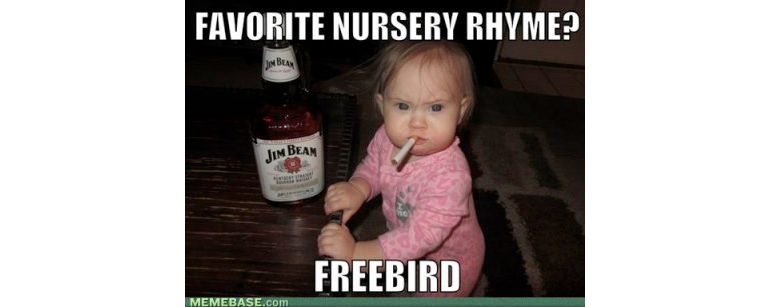The nasty looks were palpable when I took the first sip of my daiquiri. I shrugged it off, but then a well-dressed woman came over to our table and said “You shouldn’t drink in front of your child. You’ll teach them that it’s okay.”
It was a Saturday night. I had just been nominated for an award and been hired for an new dream job in the same week. My husband, M and I went out to a restaurant to celebrate. Naturally, I had a much-deserved drink.
I didn’t respond to the woman, but I did take a nice big slurp from my drink while she was standing there. She shook her head and walked off. When she got back to her table, I heard her say to her husband, “How sad to think that kid is going to grow up to be an alcoholic with parents like that.”
I think it’s a pretty big jump to assume that my daughter is going to have a problem with alcohol. I drink a maybe a drink per month and her dad never drinks.
When I do drink, I don’t hide it from her. My parents drank in front of my brother and me—we even drank on special occasions and holidays when we were teens. They said it was better for us to learn to drink responsibly and with adult supervision, so we could learn how alcohol affects us. Drinking in front of your child allowed them to demonstrate responsibility instead of leaving us to discover our first drink by going out to get drunk with friends for the first time when we turned 21.
But while neither of us are alcoholics, was the woman at the restaurant right to suggest drinking in front of your child is bad? Just because we don’t have alcohol dependencies doesn’t mean my daughter couldn’t develop her own addictions.
A commonly held position in the United States is that no one should drink before 21 – unless it’s Sunday morning. The idea is that if we prohibit drinking before a certain age, then the number of drunk drivers and other alcohol related injuries decreases. Certainly, there is some truth in this fact. However, under-age drinking is still a problem. According to the National Institute of Alcohol Abuse and Alcoholism, nearly 200,000 kids under the age of 21 end up in the emergency room each year from alcohol related injuries. And when teenagers drink, they tend to drink more than an adult would, generally five or more drinks in a single night. This tells us two things: first, despite age limits, alcohol use still exists among teens; second, the big problem is the amount being consumed.
The site Alcohol Problems and Solutions cites several studies across a number of Western countries, which all concluded that a higher age limit for drinking a first drink did not decrease the rate of alcohol abuse. Actually, the studies found the opposite to be true. When drinking in front of your child the rates for alcoholism actually decreased. The important thing here is that we teach children how to drink responsibly, rather than vilifying the practice. In a nutshell, we need to teach moderation by drinking in front of your child responsibly.
In fact, a lack of moderation is the underlying behavior for many addictions. According to Priceless Parenting, addictions to sweets happen when sugar is used as a reward or is treated as taboo. Both of these attitudes increase the attractiveness children have to unhealthy foods. The National Institute of Health says that people tend to become addicted to things when there is a strong social impulse—good or bad—that encourages the behavior. Everyday Health discusses technology addiction and how it is related to long periods of un-moderated use. These different types of addiction have two things in common: the behavior is raised on a pedestal and the behavior is not treated with moderation. This also applies to alcohol. If we try to hide it from our kids, or say “This is a grown-up drink,” we create an allure around drinking, which in turn contributes to abuse.
My husband drove home that night, of course. I would never drink and drive. Drinking in front of my child will continue in our family. She’s twelve months old now, but when she’s older I’ll even let her have a sip or two, especially on holidays. My parents did that. Dad will teach her that alcohol isn’t desirable to him, simply because he doesn’t like drinking. I’m hopeful that M will be responsible about her approach to drinking, among other things. And next time, someone comes up to me to tell me that I shouldn’t be drinking in front of my child, I’ll have a response ready.



Interesting read! I grew up in a broken family and my mom, who is not an alcoholic, started to drink in front of me when I was in grade school. She never tried to explain what she’s doing and why she’s doing it, but every time she drinks, I can feel that there’s a problem she can’t stop thinking about. Now, I’m in my teenage years and I never drink. I told myself I won’t ever drink alcohol. I don’t know if it’s because I was disappointed to see my mom drinking but nevertheless, my mom should be proud of me.